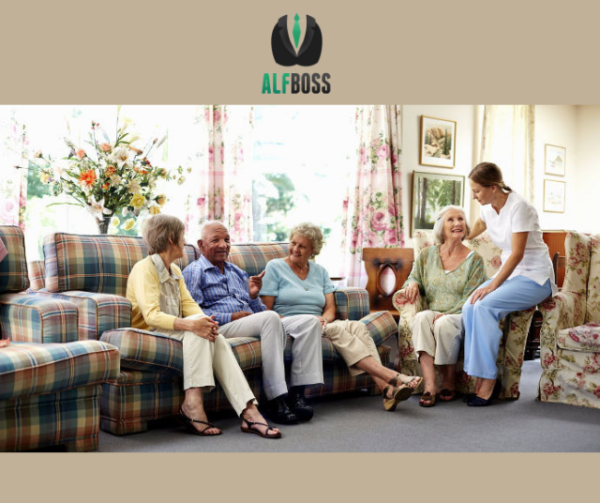
Many administrators of Assisted Living Facilities do not have the opportunity to be included in the plans
of developing the facilities they operate, meaning there is a possibility the design team is not thoroughly
versed in the regulation concerning the communities they build. With that said, you should still have a
good understanding of the following regulation regarding common areas provided by the ALF:
.
48 Common Use Areas.
A. Multipurpose Space.
(1) The assisted living program shall provide at least 35 square feet of usable multipurpose floor space per
licensed bed. Multipurpose space includes:
(a) Dining;
(b) Living; and
(c) Indoor recreational space.
(2) Usable floor space in a facility does not include:
(a) Service areas;
(b) Administrative offices;
(c) Entrance ways;
(d) Closets;
(e) Lockers;
(f) Wardrobes;
(g) Spaces where ceiling heights are less than acceptable for habitable space, as defined by the applicable
local building code; or
(h) Corridors.
(3) The assisted living program may not restrict residents from any area constituting multipurpose space unless
a comparable multipurpose space is available for resident use.
B. Living Room.
(1) The assisted living program shall make at least one living room available for resident use.(2) The assisted living program shall ensure that the living rooms are:
(a) Well lit and ventilated;
(b) Easily accessible; and
(c) Furnished with a sufficient number of reading lamps, tables, comfortable chairs, or sofas based on
residents’ needs.
C. Outdoor Space. An assisted living program shall:
(1) Provide or arrange for outside activity space;
(2) Adequately light outside activity space during all times residents have access to the space; and
(3) Provide the necessary security and supervision of the outside activity space sufficient to meet the needs of
the residents.
D. Public Toilets.
(1) An assisted living program with a licensed capacity of 17 or more beds shall provide public restrooms that
are:
(a) Sufficient in number, and appropriately located, to serve both residents and visitors; and
(b) Located close enough to activity areas to allow residents with incontinence to participate comfortably in
activities and social opportunities.
(2) The public toilet is not calculated in the ratio required by Regulation .50A of this chapter.
E. Dining Room. An assisted living program shall provide a well lit, adequately ventilated, and appropriately
furnished dining area.
F. Kitchen.
(1) An assisted living program shall have a kitchen that has adequate:
(a) Storage, refrigerator, and freezer space for perishable and nonperishable foods;
(b) Food preparation area or areas with cleanable surfaces;
(c) Equipment to deliver foods at safe and palatable temperatures;
(d) Space and equipment to wash, sanitize, and store utensils;
(e) Space to store and clean garbage cans either within or outside the kitchen;
(f) Ice-making capabilities;
(g) Equipment for the preparation of food, unless all food service is catered; and(h) Equipment for serving and distributing food to residents.
(2) An assisted living program with a licensed capacity of 17 or more beds shall comply with the foodservice
facility regulations in COMAR 10.15.03.
(3) An assisted living program with fewer than 17 residents is not required to comply with COMAR 10.15.03
unless required to comply by its local jurisdiction or the Department determines and directs that a program shall
comply with particular provisions of COMAR 10.15.03 in order to minimize health risks to its residents.
(4) An assisted living program with fewer than 17 residents:
(a) Shall obtain food from sources that comply with all laws and regulations relating to food, food
processing, food handling, and food labeling;
(b) Shall protect food from contamination while being stored, prepared, displayed, served, or transported;
(c) Shall promptly discard the following:
(i) Spoiled food;
(ii) Swelled, rusty, or leaky canned foods; and
(iii) Food exposed to fire, smoke, or water damage;
(d) May not serve to residents home-canned food or food in a hermetically sealed container as defined in
COMAR 10.15.03.02B, which was prepared in a place other than a licensed food processing establishment;
(e) Shall maintain potentially hazardous food as defined in COMAR 10.15.03.02B at 45°F or below, or
140°F or above, until served to residents;
(f) Shall maintain food equipment, appliances, and utensils in a clean and sanitary manner and in good repair;
(g) Shall maintain food contact surfaces smooth and free of breaks, open seams, cracks, chips, and pits;
(h) Shall maintain floors, walls, and storage areas in a clean and sanitary manner and in good repair;
(i) Shall provide refrigeration operated at or below 45°F and equipped with an indicating thermometer
graduated at 2°F intervals; and
(j) Shall provide freezer space operated at 0°F or less and equipped with an indicating thermo